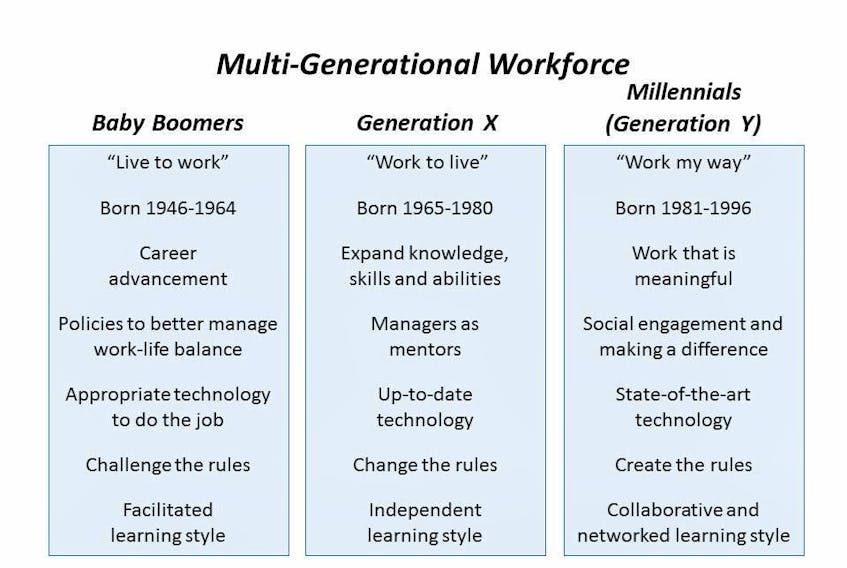BY DON MILLS
GUEST OPINION
Corporate Research Associates Inc. has been extensively involved in employee research for more than 25 years. While there have always been challenges in managing a multi-generational workforce, the challenges have never been more complex or complicated than is currently the case. This is because the Millennial Generation appears to be so different from previous generations in terms of their aspirations, behaviours and attitudes. Our research supports this conclusion.
There are currently five generations in the Canadian workforce starting with the Elders’ Generation, those born between 1928 and 1945. There are very few still in the work force from this generation. The Baby Boomer Generation follows and represent those born between 1946 and 1964. Generation X was born between 1965-1980, while the Millennials (sometimes referred to as Generation Y) were born between 1981-1996. Finally, and just beginning to enter the workforce are the Post-Millennials, born 1997 or later. Little is yet know about the Post-Millennials, but a lot is known about the other generations in the workforce.
I acknowledge that grouping people into general categories by age is a somewhat artificial method of analyzing generational differences, especially for those close to the edges of each age group. Nonetheless, it is apparent that the three main generations in the workforce (Boomers, Millennials and Generation X) differ significantly in terms of use of technologies, work attitudes and life expectations.
Our research suggests that Millennials have a generally lower level of commitment to organizations than either of the two earlier generations of workers. Millennials tend to be less likely to look forward to going to work and less satisfied with their jobs as compared to either Gen Xers or Boomers. Despite all the hype about the importance of balance in one’s life, Millennials appear less able to balance their work and home life needs than their older counterparts. This is a surprising finding.
What is not surprising, but confirmed by our research, is that Millennials are the most technologically connected generation ever. This is a generation significantly more likely to use social media in their daily lives, to use technology to manage personal finances, listen to music, manage work life, track personal fitness, manage their personal/family life and even access coupons for shopping. In terms of technology ownership, nearly 100 per cent of Millennials currently have a Smartphone. This is twice as many as Boomers. Millennials are significantly more likely than Boomers to use a TV Streaming Device and more likely to use laptops.
Millennials are significantly less likely than either Gen Xers or Boomers to define success in terms of owning property and are much more likely to define success as being well-educated and having a well-paid job. That might sound familiar to many employers. Being married or in a domestic partnership is not as highly valued as an important measure of success for Millennials, relative to their older counterparts. This might explain the delay evident among this generation in forming long-term relationships.
Attitudes at work also differ among these three main work force generations. Whereas Boomers challenge the rules and Gen Xers change the rules, Millennials try to create the rules. Boomers have long been motivated by career advancement. Gen Xers are motivated to expand their knowledge, skills and abilities, while Millennials are more likely to prefer work that is meaningful and to be motivated by social engagement and making a difference through their work. Learning preferences differ as well by generation. Generally speaking, Boomers have preferred a facilitated learning style, while Gen Xers generally prefer an independent learning style. For Millennials, the preference is for a more collaborative and networked learning style.
As you can see, it is not easy managing today’s work force. Understanding the expectations employees has always been the basis for success for any manager. Managing a workforce with multiple generations of workers is complex and complicated. Having a general sense of the major differences in work attitudes and expectations by generation provides a starting point to being a more effective manager of people.
- Don Mills, Chairman & CEO, Corporate Research Associates Inc. The Silent Majority is an occasional column addressing current issues of public interest with proprietary support data from CRA.









